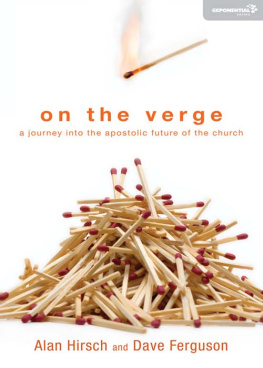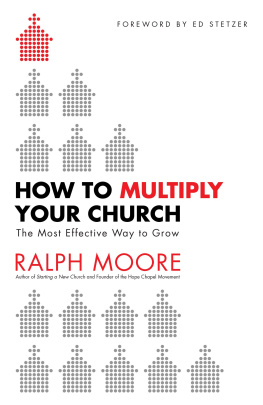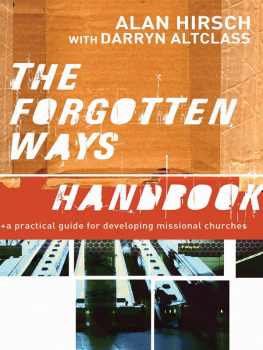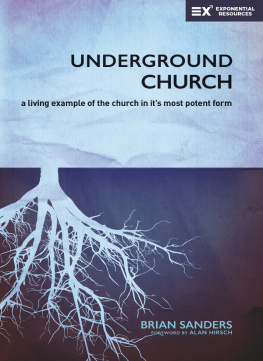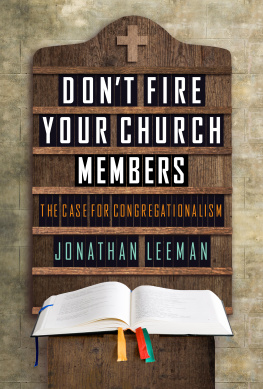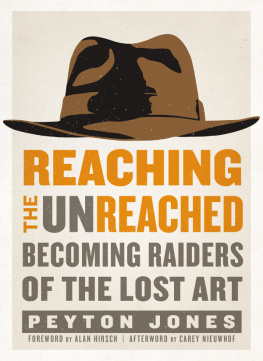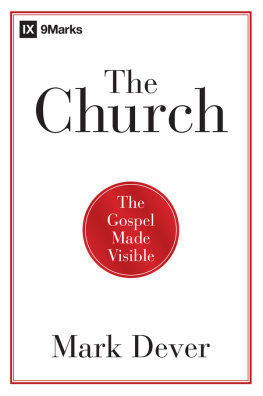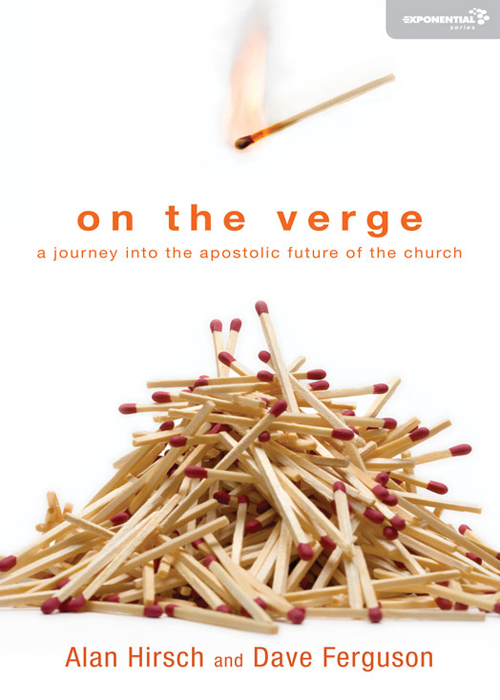

on the verge
a journey into the apostolic future of the church
Alan Hirsch and Dave Ferguson

To my comrades in Forge Missional Training Network,
especially the new networks in the USA and in Canada.
Its my joy to be identified with you.
To all the fantastic churches involved in Future Travelers.
I believe you will all get to shape the future
of Western Christianity through your actions now.
Alan
To Jon:
We shared a trundle bed growing up
and were roommates in college.
We were coworkers in the birth of a church
and the launch of a movement.
All along the way, you have been
my partner, my friend, and my brother.
Thanks.
I love you.
Dave
Contents
I love watching sports news on TV. And the kinds of sports programs I love the most are the ones with a dual anchor. The two voices provide me with interest, humor, and the right kind of depth that I am looking for in my daily sports fix. Having two voices in Dave and Alans book has a similar effect. As you consider the issues of developing a Verge church, you hear with great clarity how both the attractional and the missional are needed in equal measure. If we are to build strong centers of mission-churches that resource networks of missional congregations and communities, we need the strongest attractional forces and the most vibrant missional impulses to be present.
As you read through the text of this serious and yet surprisingly readable study, I know you will be struck by the depth of what is offered. Science tells us that our depth perception comes through our binocular vision. The binocular vision of this book provides a perspective that Ive not seen anywhere else.
As we move farther into the twenty-first century, the church will need to engage with the necessity of recalibrating our expectations of church. If we can maximize the potential of the twentieth-century church that found its final flower in the megachurch and multisite movements, we will offer a great service to the church of the new millennium. This will be achieved as the church shapes itself to respond to the missional impulse. Attractional churches that become missional begin to look like movements. If we can capture the heart and vitality of the reborn global missional impetus, we will see high-impact congregations transforming their wider communities.
A good friend of mine, Professor Eddie Gibbs, has said that the church in the twentieth century had achieved great things, but one of its sad legacies was the growing schism between missiology and ecclesiology. In his opinion, this led to a missionless church and a churchless mission. What Alan and Dave are offering is the possibility that the twenty-first century might be quite different: by reconnecting the forces of attraction and mission, we see something that is greater than the sum of its two parts. We see a church that is much more like the one Jesus intended. He was the most attractive man who ever walked the planet, and his life was a constant expression of Gods mission to the world. His church should therefore be the visible manifestation of his life.
I would encourage you to read this book more than once. My expectation is that you will find that the two voices, like the warp and woof in any good fabric, merge into a single entity. The Lords voice, we are told, is a voice of many waters. As you read this book, Im sure you will find that the voices of these two great leaders become one and you hear the voice of Jesus inviting you to join his mission and love the church he is building.
W e are living in a time when God appears to be changing the conversation he is having with the church. The dialogue revolves around the churchs self-understanding of its mission in the world. Missional church is the buzzword for this conversation. While there are some nuances and various dialects of missional being spoken, widespread agreement exists around a core expression of what it means to be missional. The missional church engages the community with the intent of being a blessing. It looks for ways to connect with the world beyond the walls of church real estate and programming.
For many congregations, this external focus finds expression through service, not more services. The congregation becomes the church not just in the community but for the community. Cross-domain collaboration with other sectors of the city enables the church to begin to address some of the challenging issues that threaten the welfare of the city. Typically, existing congregations are entering the missional movement across this threshold.
More recently, a new expression of missional church has captured the attention of those of us who are tracking the missional movement. It is the rise of missional communities. This development signals the arrival of a new life form in the taxonomy of church life. The emergence of missional communities is part of the Spirits response to deploying the church in an increasingly postcongregational era. Translated into English, that means the church is figuring out a way to be present in populations that are not susceptible to becoming church people (people who align their spiritual journeys with the goals and rhythms of organized congregational church). Yet these people are spiritually inquisitive and open to relationship with Jesus and with other believers. It is just that their lifestyle or their employment or their personal interests dont intersect with the spiritual scripting of congregational church.
Missional communities take the church beyond engaging the community. These life forms are church lived out in the community. These missional communities are all the church that many people will ever know or ever need. They are real church, not church lite or quasi church.
Establishing missional communities can become a key part of the missional strategy of existing congregations. In the book before you, Dave Ferguson and Alan Hirsch explore this possibility, specifically in the context of how mega-congregations can implement and fast-forward this approach to mission.
There can never be a timelier conversation than the one God wants to have! And there could never be two more qualified voices to further the dialogue. Dave and Alan embody the right approach to the discovery of new life: a sense of wonder, a spirit of curiosity, and a genuine stewardship that what they have uncovered not just belongs to them but also has been entrusted to them to be shared with others.
I am thankful they have invited you and me into the conversation.

I t is with a deep sense of privilege, mixed with an urgent and deep-rooted sense of obligation to God and his church, that we offer On the Verge to you. We would even be bold enough to claim we feel called to write this book. But we do so in fear and trembling, because we also recognize it is largely a visionary book that points to a possible future that is only beginning to be worked out as we speak.

